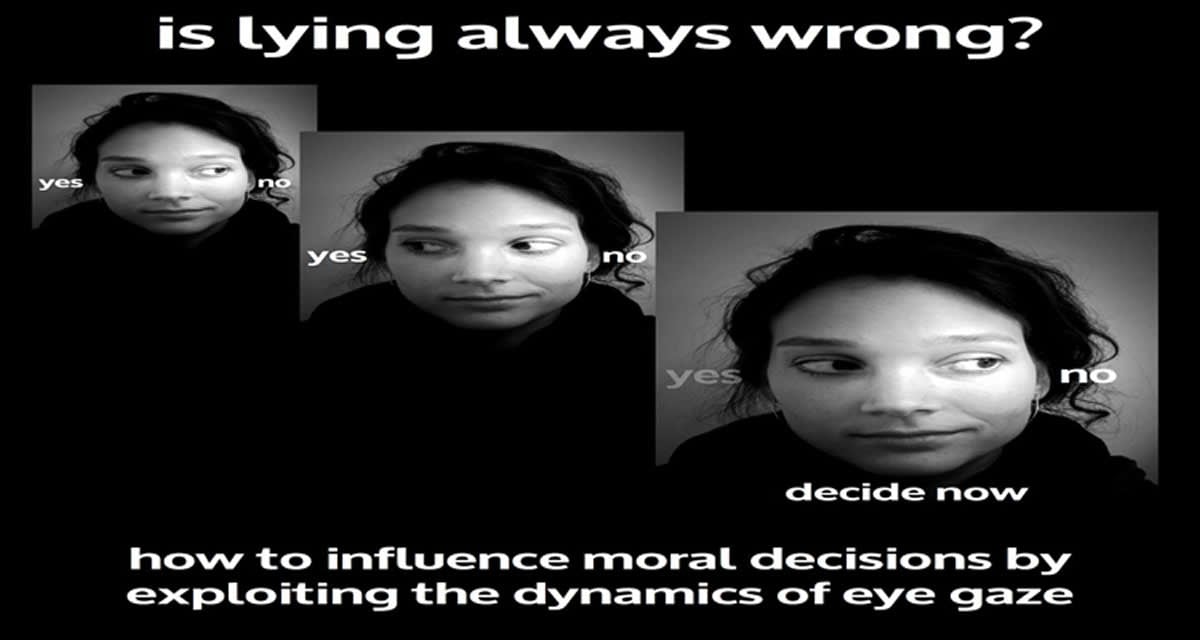Moral decisions can be influenced by tracking moment to moment movements of the eyes during deliberation, finds new research from Lund University, Sweden, University College London and University of California Merced.
Many of the choices we face in daily life have a moral character, from deciding whether to give money to a homeless person asking for change to separating out recyclables from the trash.
“People often assume that their moral opinions are stable preferences that already exist in their hearts and minds,” says Michael Spivey from the University of California, Merced, “but we hypothesized that many of your moral decisions may arise ‘on the fly’ as a result of how you look at and interact with your environment.”
Using a novel experimental paradigm, the researchers used remote eye-trackers to monitor participants’ gaze while they thought about complex moral questions such as, ‘Is murder sometimes justifiable?’. The participants were presented with two alternatives to each question, and were asked to consider which those they considered to be morally right. Although they were completely unaware of it, participants’ eye movements were determining when they were told to make their decision. For each trial, a target alternative was randomly selected, and once the eye tracker registered that the the participants had looked at the target for a certain amount of time, they were asked to make their decision immediately. The results showed that the participants’ moral decisions were systematically biased towards the target. Overall, they choose the randomly selected alternative as their own moral opinion in 58% of trials, rather than 50% without the manipulation.
“What we find in this study is that the precise timing of our decisions can be a powerful influence on the choices that we end up making. The process of arriving at a moral decision is not only reflected in people’s eye gaze but can also be determined by it,” Philip Pärnamets, one of the authors from the University of Lund, explains.

The participants were influenced without being presented different arguments or information; instead, the paradigm exploits the fact that where people look reveals their moment-by-moment thought processes. This suggests, says Pärnamets, that the process of arriving at a moral decision is intertwined with process of looking at the world, and more generally, that peoples’ decision processes are reflected in their eye gaze.
“In other words, the same interplay between the brain the hand and the eye that plays out when we reach for a cup of coffee, is also involved in reasoning if something is morally right or wrong,” says Daniel Richardson, one of the authors of the study from University College London.
The study is the first to demonstrate causal links between and gaze and moral choices, but builds on previous work on how gaze is reflected in simple choices, like those between foodstuffs. Daniel Richardson explains: “Scientists already knew that when we look back and forth between two items on a menu, for example, our gaze patterns reveal what we might choose. Our main contribution is to show that by controlling exactly when someone makes a decision, we can influence what they decide”

“Today, all sorts of sensors are being built into mobile phones,” says Petter Johansson from the University of Lund and one of the authors, “and they are even able to track eye movements. Simply by monitoring small changes in our behaviour, these devices have the potential to aid our decisions in ways that have not been possible before.”
Contact: Daniel Richardson – UCL
Source: UCL press release
Image Source: The images are credited to Daniel Richardson and are adapted from the UCL press release
Original Research: Full open access research for “Biasing moral decisions by exploiting the dynamics of eye gaze” by Philip Pärnamets, Petter Johansson, Lars Hall, Christian Balkenius, Michael J. Spivey, and Daniel C. Richardson in PNAS. Published online March 16 2015 doi:10.1073/pnas.1415250112






